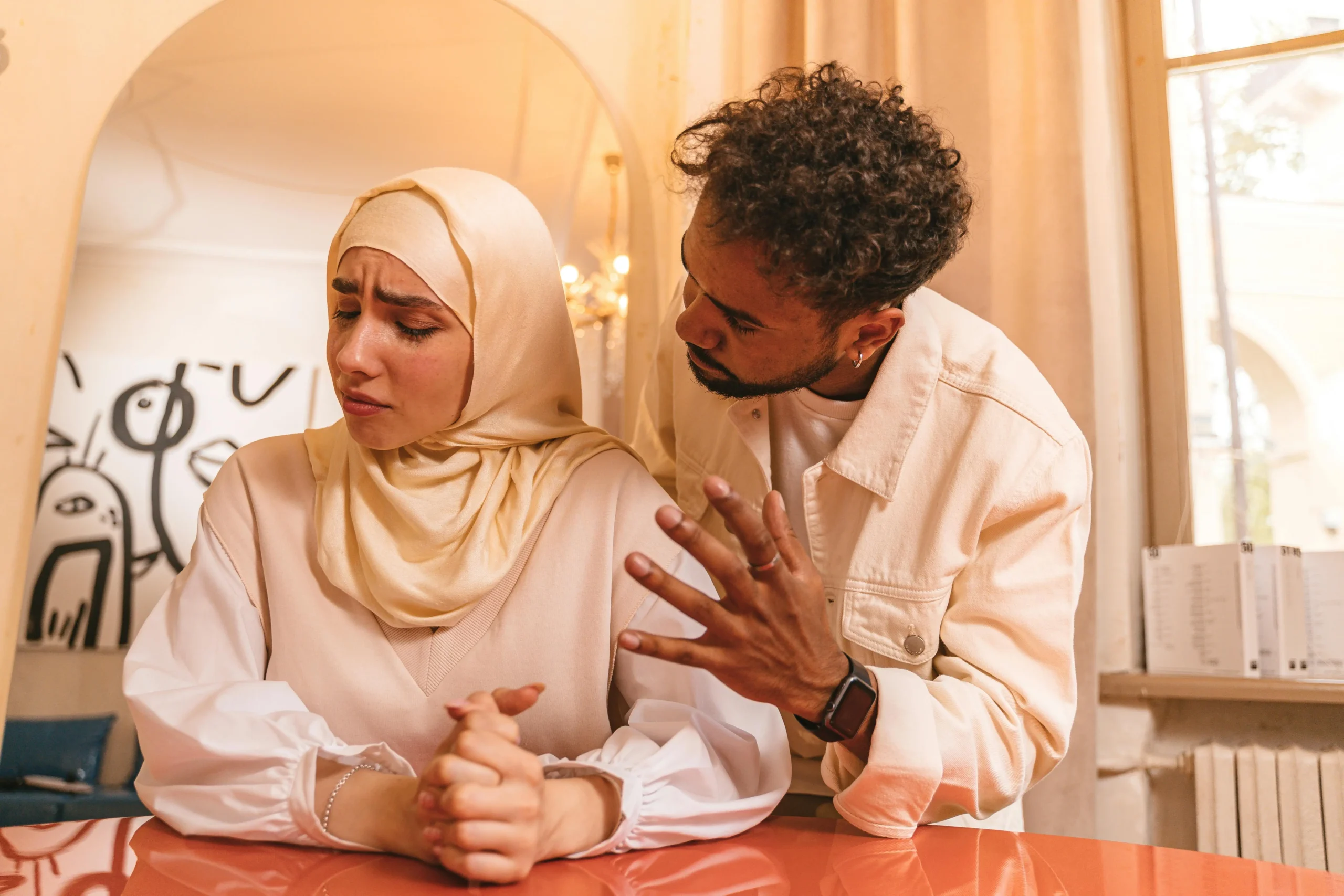I. Introduction: Conflict Resolution in Relationships
Let’s be real, conflict resolution in relationships isn’t just about ending fights. It’s about figuring out how to move through the tough moments together without hurting each other along the way. It’s totally normal for couples to disagree—just like it’s normal to feel attracted to each other. These disagreements usually come from how we were raised, different expectations, or just everyday stress. But here’s the good news: they don’t have to be a bad thing. In fact, they can actually make your relationship stronger.
When couples learn to face conflict with grace and curiosity, they unlock a deeper kind of connection. A strong relationship isn’t built by avoiding problems, but by how you deal with them together. In this blog, I have unpacked the real art behind resolving conflict, showing you not only how to stay connected during tough conversations but why it’s the key to long-term emotional intimacy.
So, if you’ve ever found yourself wondering “How to resolve conflict relationships?” or searching for practical tools to stop the cycle of misunderstandings, you’re in the right place.
II. The Foundations of Conflict Resolution in Relationships
A. Why Conflict Happens
Before we dive into the “how,” let’s get clear on the “why.” Everyone brings their own emotional baggage into a relationship—like values shaped in childhood, the way they saw people communicate growing up, and needs they’ve never voiced out loud. All of this can show up as tension, even during small, everyday moments.
One partner might see financial planning as security, while the other sees it as restriction. One person might love being spontaneous, while the other prefers having a set plan. It’s not that one is right and the other is wrong—they’re just different. And that’s what most conflict comes from: differences, not something being broken.
When couples start seeing conflict as a sign of their individuality, it becomes easier to stop treating every disagreement like a red flag. A clash doesn’t mean love is falling apart—it just shows that two people still care enough to show up, speak up, and keep trying.
So instead of asking, “Why are we fighting?” The better question is, “What are we learning about each other right now?”
B. The Importance of Conflict Resolution in Relationships
Let’s get real—conflict itself isn’t what hurts a relationship. It’s the unresolved conflict that does the damage. When problems are left hanging, they slowly wear down trust. Unspoken frustrations build walls between partners. And in the end, it’s not the fight that breaks the bond—it’s the silence that follows. Without healthy conflict resolution in relationships, even the strongest connections can start to fall apart.
But here’s the good news: resolution builds resilience.
When both partners really listen, take responsibility, and try to understand each other, it creates emotional safety. Disagreements stop feeling like threats and start becoming chances to grow—together. It’s in those honest conversations that couples find clarity, compromise, and closeness.
So, what are the 5 conflict resolution strategies? Knowing them gives couples a roadmap to get through the tough times.
But more important than any method is the mindset: conflict doesn’t mean the story is over—it’s often the bridge to a stronger next chapter.
III. Key Principles and Strategies for Conflict Resolution in Relationships
Conflict resolution in relationships isn’t about avoiding disagreements—it’s about facing them with empathy, intention, and mutual respect.
When handled the right way, conflict doesn’t have to drive a wedge between partners. In fact, it can be a chance to grow closer, strengthen trust, and better understand each other.
Here are eight powerful strategies that can help turn tension into a deeper connection:

1. Manage Emotions First for Conflict Resolution in Relationships
Before you even say a word, check your emotions. Trying to solve a problem while you’re angry is like trying to fix a leaky pipe in the middle of a thunderstorm—messy, chaotic, and usually unhelpful.
Tip: When things start to heat up, take a step back. Go for a walk, take a few deep breaths, count to 10, or write down what you’re feeling. Once you’ve calmed down, you’ll be able to approach the conversation with more clarity and kindness.
Emotional regulation is the quiet superpower behind conflict resolution in relationships.
Being aware of your own emotions doesn’t make you weak—it makes you wise. Couples who learn to pause and reflect before reacting often feel more connected, even when they’re working through tough stuff.
2. Commit to a Win–Win Approach
You’re not rivals in a courtroom—you’re partners building the same life. Shifting the mindset from “me vs. you” to “us vs. the issue” is a game-changer.
Instead of keeping score, shift your focus to finding a solution that works for both of you. This kind of teamwork turns arguments into chances to collaborate, not compete.
If you’ve ever asked, “What does conflict resolution mean in relationships?” — it starts right here: giving equal value to both perspectives and making sure both voices are heard.
Ask yourself, “How can we both leave this conversation feeling heard, respected, and understood?”
That question is your compass—it keeps you focused on connection, not just correction.
3. Listen with Purpose
There’s listening, and then there’s listening to understand. One of the most underrated tools in conflict resolution in relationships is the ability to pause your inner response and truly tune into your partner.
Try this: Use the “two-minute rule.” One partner speaks for two uninterrupted minutes while the other listens—then switch. Follow it up with a simple, “What I’m hearing is…” to reflect and validate what was said.
Validation doesn’t mean agreement—it means acknowledging your partner’s reality, which is often more powerful than offering a fix.
4. Communicate Clearly and Respectfully for Conflict Resolution in Relationships
Language shapes reality. Instead of launching into accusations like “You always…” or “You never…”, reframe them with “I” statements.
For example:
❌ “You don’t care about me.”
✅ “I feel unimportant when we cancel plans last minute.”
Stay focused on the present. Bringing up old arguments only clouds the current issue and adds unnecessary weight to the conversation. To truly move forward, lead with clarity, kindness, and focus—they’re the foundation of healthy communication.
And if you’re still asking yourself, “How do I fix a broken relationship?”—the answer often begins with changing how you communicate, even before you change what you’re saying.
5. Embrace Acceptance and Curiosity for Conflict Resolution in Relationships
You don’t have to agree to understand. Not every disagreement requires consensus—but every conflict does require curiosity.
Instead of trying to change your partner’s mind, explore it. Ask open-ended questions like, “What does this situation feel like for you?” or “What need isn’t being met here?”
Conflict resolution in relationships flourishes when both partners shift from “How do I win?” to “What can I learn?” Curiosity opens doors. Judgment slams them shut.
6. Brainstorm Solutions Together
Once both sides have been heard, it’s time to work together on a solution. Rather than settling for compromise—where each person gives something up—aim for true collaboration. That means finding a path where both of you feel understood, supported, and valued.
Example: Instead of saying, “Let’s just meet in the middle,” try asking, “What would the best outcome look like for each of us?” Then, look for the common ground and build from there.
This kind of solution-focused mindset strengthens two key pillars of a healthy relationship: equality and commitment. It’s what real conflict resolution in relationships looks like.

7. Set Ground Rules for Arguments
No one wins when a fight becomes a free-for-all. Just like sports need rules to keep the game fair, relationships need boundaries to keep conflicts constructive.
Examples of ground rules:
- No interrupting
- Take breaks when emotions spike
- No name-calling or bringing up the past
- Revisit the issue later if needed
These aren’t just guidelines—they’re safety rails that protect emotional intimacy, even when the road gets bumpy.
8. Own Your Role and Repair for Conflict Resolution in Relationships
Here’s the truth: every conflict has two sides. Taking ownership of your part—without defensiveness—paves the way for healing.
A sincere apology is more than just words; it’s an act of emotional responsibility. Combine it with “repair behaviors” like validating your partner’s pain, using gentle touch, or checking in the next day.
As couples heal together, they build a stronger emotional bond. And yes, conflict resolution in relationships often begins after the fight ends—with the courage to say, “I’m sorry. Let’s rebuild.”
IV. Understanding Conflict Resolution Styles
Every couple fights—but how they fight makes all the difference.
There are several distinct styles of navigating disagreements, each with its own rhythm and impact on a relationship. Understanding your default approach to conflict resolution in relationships is the first step to consciously evolving it.
1. Avoiding
The silent tension. This style ducks confrontation in hopes it’ll disappear. While useful for cooling down, chronic avoidance can lead to emotional distance and unresolved resentment.
2. Accommodating
The peacekeeper. Often rooted in a desire to maintain harmony, accommodating partners may sacrifice their needs to keep the waters calm. Over time, this can result in unmet emotional needs and burnout.
3. Compromising
The fifty-fifty fix. On the surface, it seems fair—each person gives a little. But not every problem should be halved. Some require a deeper dive into what truly matters to each partner.
4. Competing
The fighter. When one or both partners seek to “win” an argument, connection becomes a casualty. While this may work in business or sports, in love, it breeds power struggles and mistrust.
5. Collaborating
The gold standard. This style invites both partners to work together toward a mutually beneficial solution. It combines honesty, empathy, and creativity—qualities that are foundational to healthy conflict resolution in relationships.
✨ Pro Tip: Want to evolve your style? Start with self-awareness. Ask yourself: When conflict arises, do I lean in or shut down? Do I listen or defend? Then, challenge yourself to lead with collaboration, even if it feels unfamiliar.
When wondering What does conflict resolution mean in relationships?, the answer lies in this very practice: learning to meet each other as teammates, not opponents.

V. Conclusion: Conflict Resolution in Relationships
Let’s be real—conflict can get messy. It’s loud, uncomfortable, and often emotional. But here’s the thing: conflict isn’t the problem. It’s poor communication, avoidance, and finger-pointing that really hurt relationships.
Conflict resolution in relationships isn’t about never fighting—it’s about learning to fight in a healthier way. It takes emotional self-control, honest listening, and a shared willingness to grow. And yes, it’s work—but it’s the kind of work that builds deep, lasting connection.
So if you’re wondering, “How can I fix a broken relationship?”—start by paying attention to how you show up during conflict.
Not just with your words, but with your presence, empathy, and willingness to own your part.
Every disagreement can be an invitation—an invitation to understand your partner more deeply, to heal what hurts, and to strengthen your bond.
With practice, patience, and a whole lot of grace, conflict can stop being a wedge—and become a bridge.
Because the goal isn’t to avoid conflict. It’s to get better at facing it—together.

